Barns, breaks and barebones recording: The making of Khruangbin’s Mordechai
Out in Burton, Texas, a group of three crate-digging musicians lay down experimental, 70s-inspired sounds with nonchalant producer Steve Christensen and his mobile recording studio.
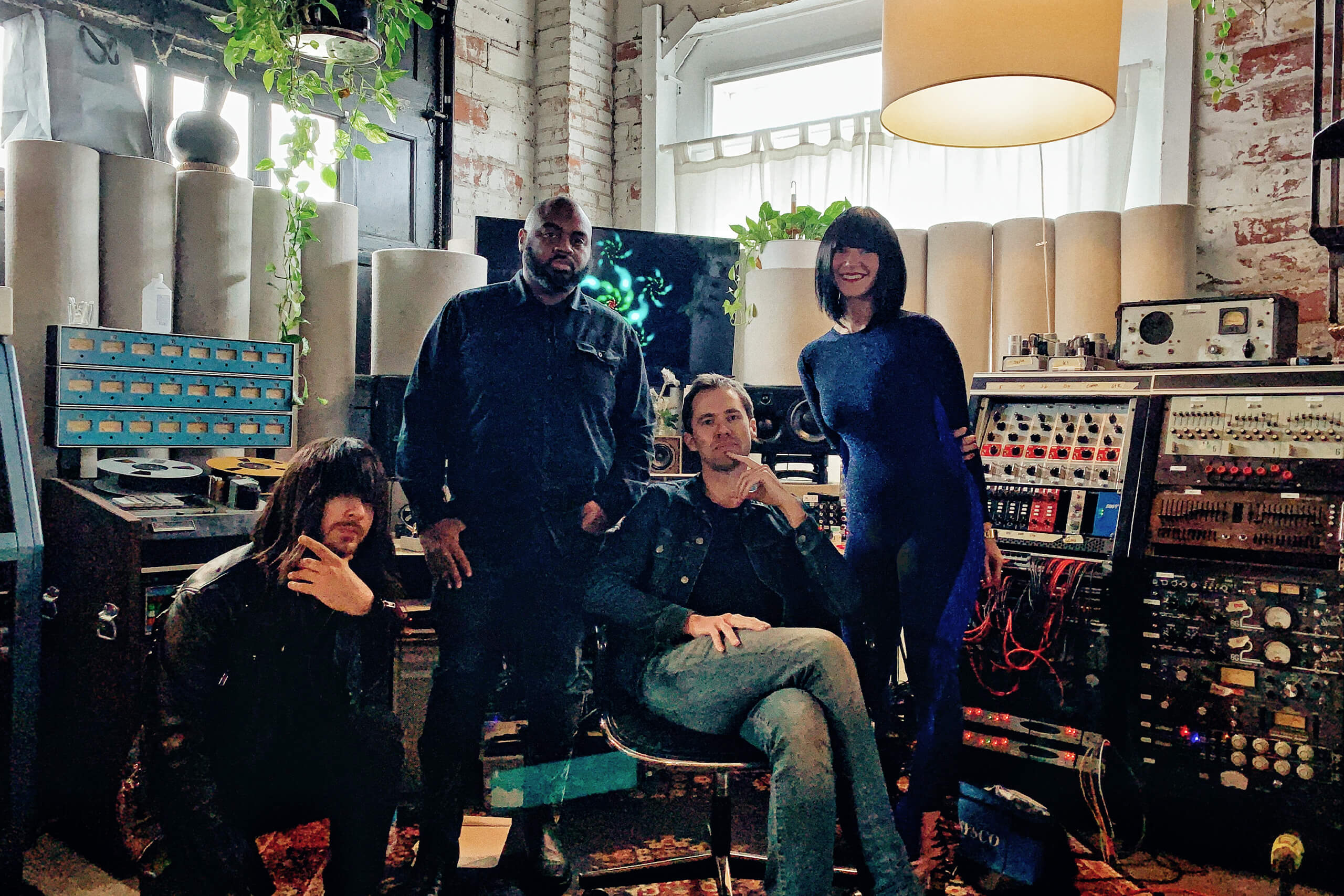
(L-R) Guitarist Mark Speer, drummer Donald “DJ” Johnson, producer Mark Christensen and bassist Laura Lee
“There’s just no way we could do this in a standard studio”, says Khruangbin’s guitarist, Mark Speer, shaking his head. Bassist Laura Lee Ochoa, and drummer, Donald ‘DJ’ Johnson, nod in agreement. The bohemian recording setup that Khruangbin embrace in the creation of their work sees the trio disconnect themselves from the buzz of Houston and head out to a barn in the countryside to craft their art. Khruangbin’s rehearsal space, writing room and recording studio is quite literally amongst the flora and fauna of rural Texas.
“I mean, it’s a barn. It’s a dirt floor”, laughs Khruangbin’s long-standing, Grammy-winning producer, Steve Christensen. “You’re totally beholden to the elements. If it rains, it’s over”.
If the group’s previous works weren’t enough to prove that this curious approach to recording can spark magic, then perhaps the third chapter of the story, Mordechai, will be enough to have you in the middle of a cornfield with a mixing desk.
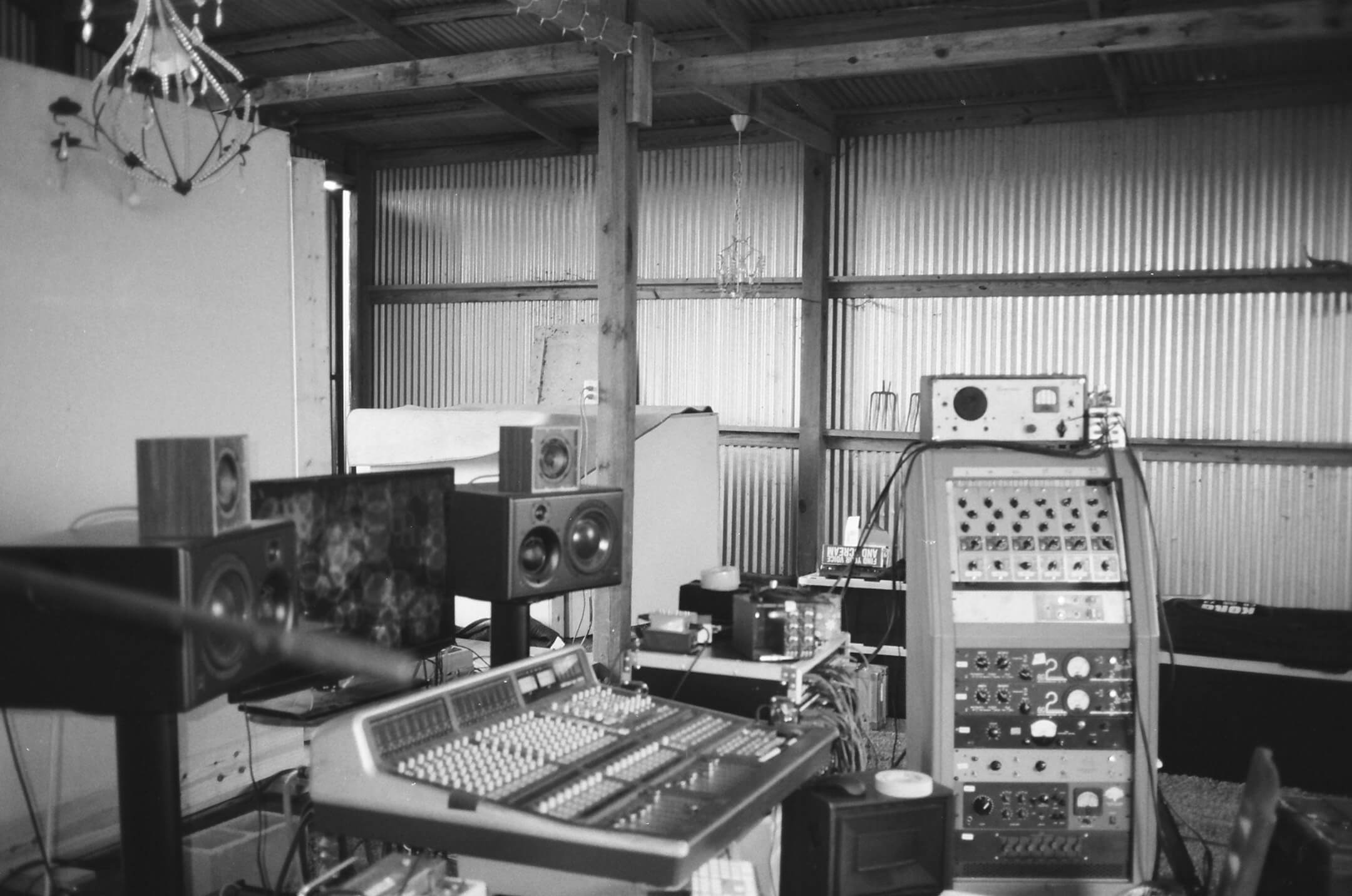
Open field
Steve Christensen has been producing Khruangbin since their first EP release, A Calf Born in Winter. Not much has changed in the creative process in the six years since then. “For our very first session together, Mark hit me up about going out to their barn and capturing their live performance”, Steve recounts. “I had a mobile rig so I could do it, and we’d worked together in the past. It was just like, Wild West. It was a let-it-bleed, band in the room situation and I just put a bunch of mics near them, with no effort to isolate them or anything like that. They were so well-rehearsed and it was just this magical, beautiful sound and we had this amazing, awesome, creative four days”.
Following the success of their EP releases on Night Time Stories – a subsidiary of the revered Late Night Tales compilation label – with support from Bonobo, Khruangbin released their first album, The Universe Smiles Upon You. The debut led to them playing at major festivals and supporting the likes of Tycho and Father John Misty on their respective tours. Their follow-up, Con Todo El Mondo, cemented their place as a force to be reckoned with, albeit a chilled-out one, receiving critical acclaim and expanding their cult following.
Fast forward to 2020 and you’ll see that Steve’s explanation of how the Khruangbin sound was captured in these albums is almost the same for Mordechai. The key difference between the third album and its predecessors was the collective decision to have slightly more control over the individual instruments.
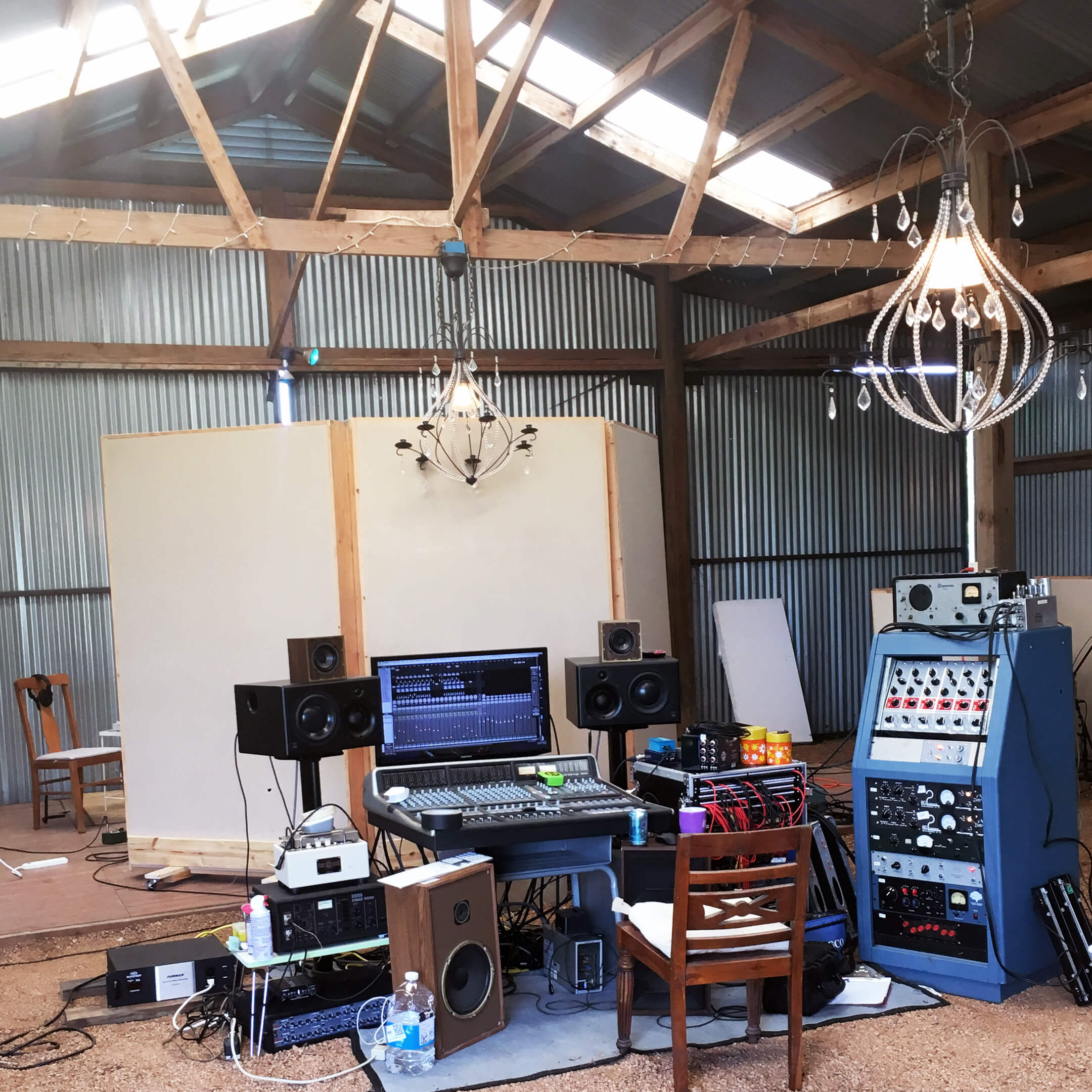
“This album, in particular, has a much tighter sound because I brought so many more things out to the barn in order to be able to control the space. I had to bring all of my gobos and all of my baffles out there”, Steve says. Khruangbin strictly record their music as a trio with minimal overdubbing, so reducing bleed and adjusting the acoustics of the barn is the most practical way to control the sound without disrupting the dynamic of the band. “They have to play as a trio”, Steve continues. “The sound of that band is the sound of the three of them playing together”.
Backseat
Although his impressive portfolio began with a chance gig as a live engineer for Destiny’s Child, Steve’s wisdom is more a result of trial and error than following strict guidelines. “I used to read all these articles about classic recordings where they were interviewing the engineers and the producers. They would talk about how they recorded it and then maybe I would try to use some of those techniques on my own recordings, but it always sounded terrible. And it was always frustrating. And I’m realising now that the techniques play a tiny role. Especially with Khruangbin – it’s just what they sound like”.
Steve is nobly reluctant to attribute the band’s unique sonic characteristics to his decisions as a producer. “The only creative decision I made”, he claims, “that maybe has an impact on the Khruangbin sound was that I chose to use only dynamic mics on them from the start”. Since then, a condenser mic has not been used once in the capturing of the band’s instruments and vocals. “My investigation of these awesome records from the 60s and the 70s – this golden moment of music – was what I brought to the early sessions because I didn’t want to record them in a modern fashion. I wanted to record them with more of an old school technique”.
Steve Christensen: “I chose to use only dynamic mics from the start”
“Even on the drums, you know, it’s real simple”, he continues. “An AKG D20 B on the kick, a Sennheiser MD 441-U on the top snare and MD 421 on the bottom. Then some SM57s on the toms and then an AKG D19 as an overall mono overhead”. Laura’s bass is recorded via a Highland Dynamics BG2 as a DI with a dynamic mic laid underneath, running through a Tree Audio The Branch channel strip. Mark’s guitar is simply recorded with a Beyerdynamic M160 dynamic ribbon mic on his amp – “it’s a hyper-cardioid mic, so that helps lessen some of the bleed a little bit”, Steve says.
However, as is usually the case with music production, it doesn’t quite end there. Steve records into Pro Tools via a variety of tube mic preamps, along with some extremely light compression. “I do some basic compression on the bass. Honestly, that’s it. I only compress the bass. It’s just a little bit, you know”. Mark’s guitar runs through a set of pedals before being picked up by the amp mic, and Steve may add a touch of effects after the fact. “I bring my spring reverbs and my tape delays, and while we’re recording I’m adding and printing those effects”. Couple this with the natural ambience of the band’s spiritual home – the barn – and the result is spacious, psychedelic sounds.
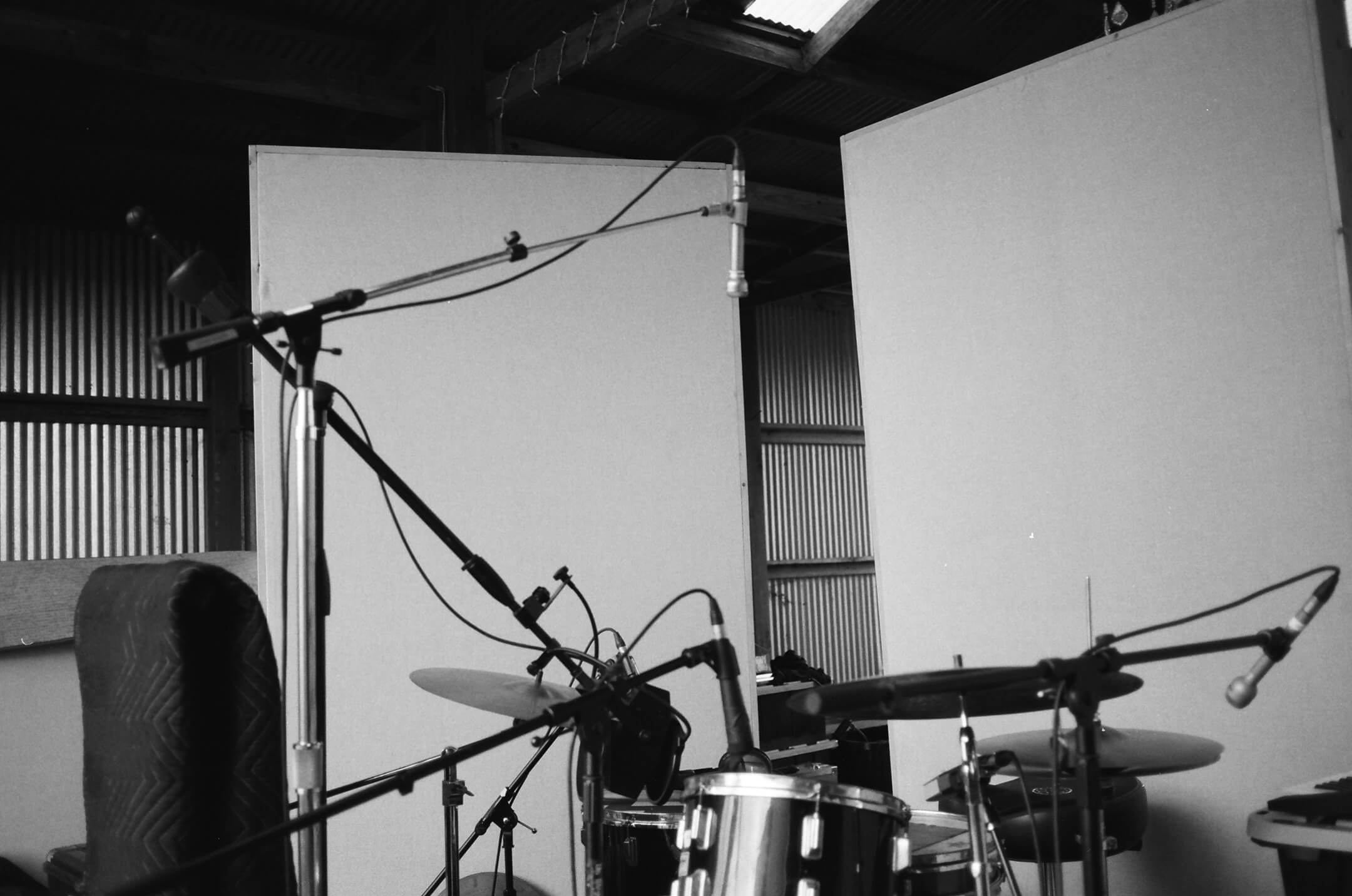
Although Steve and Khruangbin try to avoid adding extra layers and overdubs in the production process, Mordechai sees the band’s vocals take centre stage on some songs, more so than on their previous albums. This meant going back and tidying up certain takes – or in the case of the third track on the album, Connaissais de Face, adding more ‘coolness’ to the music. When listening back to the track, Steve said to the band: “‘Guys, this just needs to be a little bit cooler. You know, it’s just like not quite cool’. And that was all the feedback they needed. Then Mark and Laura were like, ‘Oh, okay’. So they left and drank tequila and then came up with the idea of doing this spoken word bit. They wrote a story about people in Houston, at a place in Houston that they used to know. And they were sort of reminiscing about the past in Houston, and they decided to do this sort of, like, you know, spoken sexy thing on top of it, and that ended up being cool”.
Mark joins in on the mixing process, with his dub background adding a new element to the overall sound. “Mark is a really talented engineer in his own right. He comes from dub, where he uses the recording studio in a really creative way. Dub music is just heavy-handed; it’s a really interesting way to use the control room to really craft a sound. And he’s amazing at that. I knew that, so then the way it started was that I would set Mark up at the console and let him dial in how he heard the sound and then he taps me in and then I would refine it. That kind of solidified the KB sound, you know, it’s actually getting Mark on the board and letting him make some creative decisions”.
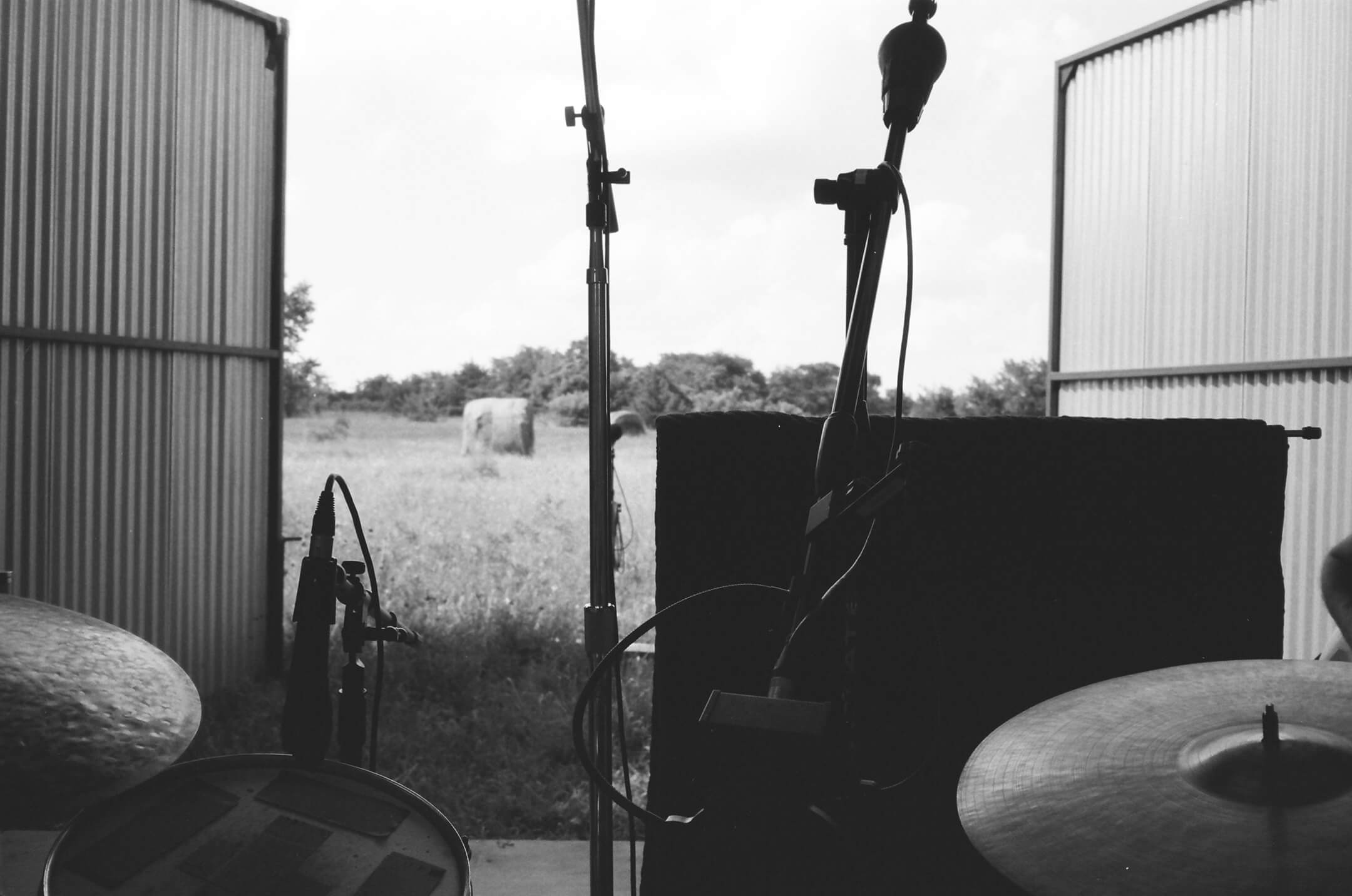
Under pressure
One of the more impressive yet less-spoken-about aspects of Khruangbin’s discography is that the vast majority of the music is written and recorded in the short time that they’re at the barn.
“Sometimes we’ll come with bits and pieces of songs and put pieces together in the barn, but a lot of times you see what sounds good and what moves and you kind of go from there”, Mark says. The trio may spend anywhere from a few days to a fortnight at the barn creating music. This approach has an old-school air that couldn’t be further from the idea of obsessing over in-the-box snare sounds.
Laura Lee Ochoa: “Being out there does a lot for the writing process because we’re cut off from everything”
“Each album has its own universe and you go on a ride and you don’t know where it’s gonna spit you out”, Laura adds. “And that just happened to be what came out of this project. We didn’t have any intention going in. It’s like you’re throwing paint at the wall and then you see what the colours look like. If it’s looking good, you keep going down that path”.
As any producer or engineer may know though, keeping artists in check and in a creative headspace is an art form in itself – Steve is acutely aware of this, too. “This is the third time that we’ve gone out there, set everything up and they don’t have any songs and they write the songs on the spot. It really is an ‘Oh shit’ moment. They have to be under that pressure in order to write, and being out there, disconnected in that environment really helps that. But it gets to a point where I’m like, ‘Guys, there are no songs’. They play and everything sounds beautiful, but there’s no song, you know? So then I go home and I’m like, ‘let me know when you have some songs written’. That’s when Mark and Laura go into this interesting creative zone, which I think is a little bit of fear, insanity and pressure. They come up with some amazing ideas and at that point, DJ gets tapped in, which is when those song ideas get whittled down into arrangements. This is the first time they ever play those songs and ideas in their entirety.”
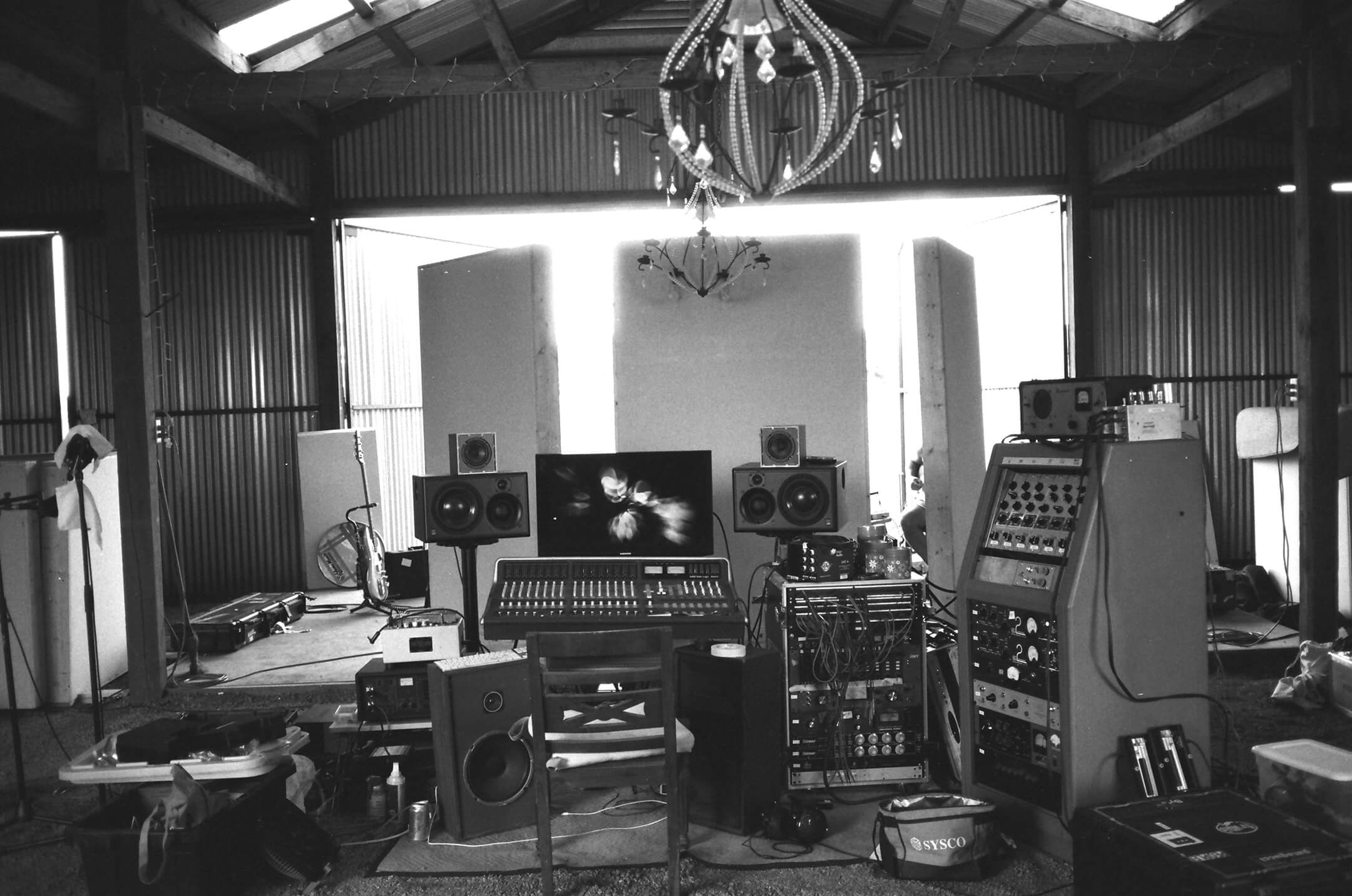
Remote recording
Thankfully, the barn is more than just a space to capture unique, vast recordings – it’s an escape from the hustle and bustle of modern life. “It does a lot for the writing process, in general, being out there because we’re cut off from everything” Laura explains. “There’s no Wi-Fi, you’re not near anything out there. So it’s like when you’re at the barn – it’s time to write. And that’s all there is to do. Whereas, if you’re in a studio in New York City or LA, you’ve got friends that are coming round, or you’ve got some stuff to do in the morning or whatever, but if we block out a stretch of time to be at the farm then that’s all we’re doing”.
Recording Mordechai wasn’t quite as intense as the band’s previous production sessions, leaving a little more time for reflection instead of pushing to get the tracks done in a short timeframe. “The last few albums we did in one sitting. In this album, we did it in three chunks. So when you take a break from a project, you kind of allow it to marinate or simmer. There’s something to be said for that additional aspect of this record”, Laura adds.
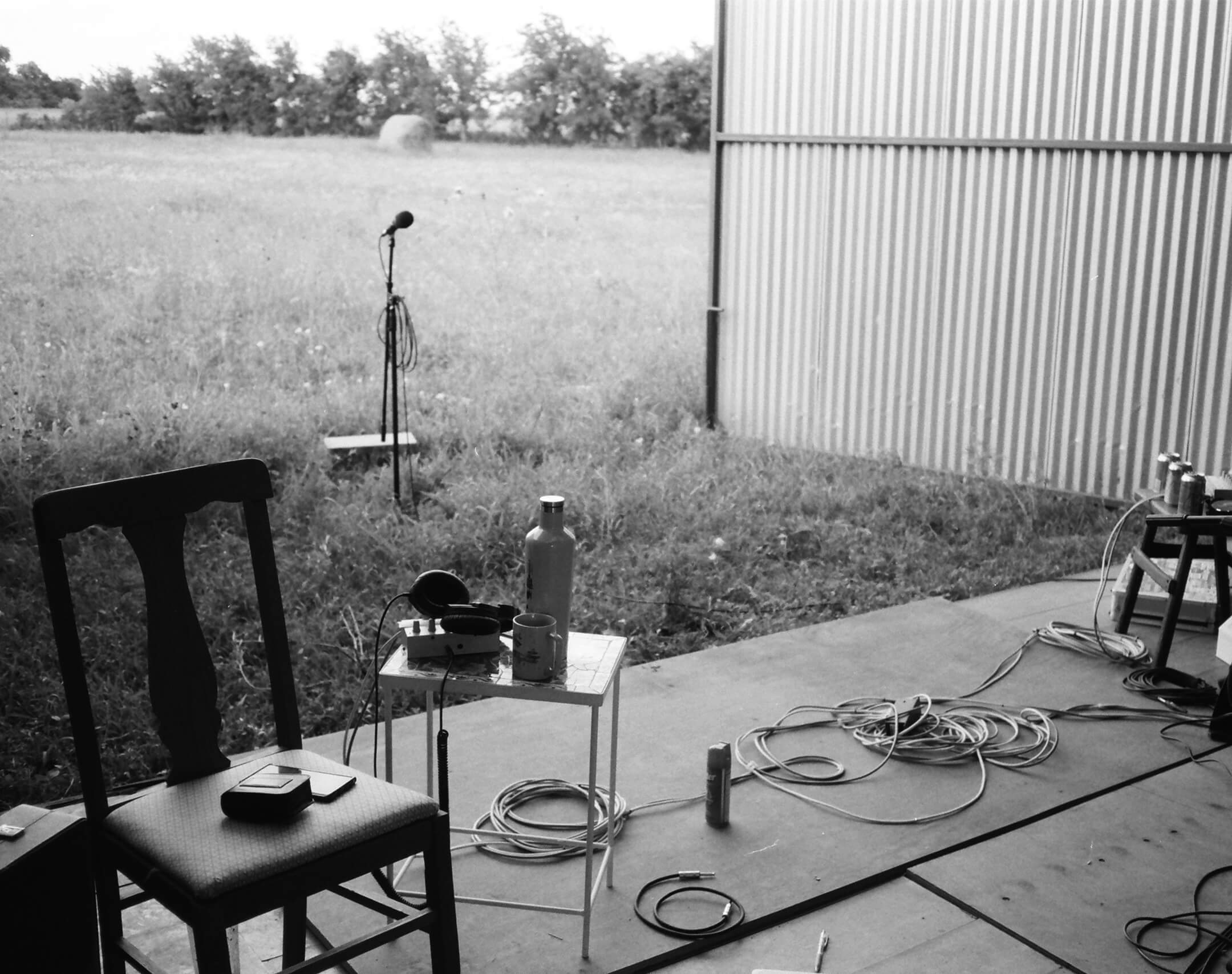
Listen to the surf-rock, psychedelic sounds of The Universe Smiles Upon You and the exotic, laid-back funk sounds of Con Todo El Mundo and it will be fairly obvious that these sounds are not borne from American culture. It’s a well-known fact that Khruangbin’s passion for discovering old records from Thailand, Iran and other Asian and Middle-Eastern countries is the driving force of their unique character. The band’s name translates from Thai as “aeroplane”, for example. However, without their hometown of Houston, this diverse range of inspiration may never have coalesced in the way it has for their latest release. The band’s recent EP with Leon Bridges, Texas Sun features a heavier dab of Americana and Soul, and this also infuses Mordechai.
“Houston is a melting pot of all kinds of different cultures”, DJ elaborates. “I think we’ve been influenced by different cultures, language and techniques. It’s a natural progression that happens, living in a city that’s so culturally diverse. And I think Mordechai ended up sounding like Houston because, although it has so many different influences from all over the place, all of those can be found right at home.”
“I never would have gotten into digging for records if it wasn’t for growing up in Houston”, says Mark. And that crate-digging obsession has taken them around the world, both physically and with AirKhruang – the band’s radio show curated by the trio and hosted by an algorithm, which selects the next track based on the characteristics of the one currently playing.

Infinite loop
Those lucky enough to catch Khruangbin live may get to experience the instrumental hip-hop medley near the finale of the show – or at least a medley of tracks from which the original samples were taken. When listening to the band’s discography, hints of hip-hop shine through, but it’s not quite enough to detect that there is some subtle chopping and resampling taking place in the productions.
“Most of our writing process has to do with sampling ourselves and chopping ourselves up and moving it around,” Mark says. “Especially if you’re just like, ‘Man, I’m not inspired by playing the guitar right now, nothing’s happening. Why don’t I take our song that I really, really like and then cut that up and try to recontextualize it and make something brand new?’”.
Though the music of Khruangbin sounds as if it’s constantly evolving, the reality is that everything is based around loops, and is initially written to drum breaks. Laura describes her process: “When I’m writing bass lines, I’m usually writing them to a drum loop, so what ends up happening is when I write, I automatically think about writing in a loop and with hip-hop, if you can get a good loop, it’s the whole song”.
Mark Speer: “I just wanted to make a song with a disco breakdown”
Mark’s understanding of loops helps build the music, too. “If you can make a loop you can listen to over and over and over again and it still sounds good… Well, then you either made a house song, or you’ve made hip-hop, or some type of electronic music where it’s not the chord shape that matters. It’s not like Section A going into Section D, it’s just that eight bars of essentially the same chord progression. And at this point, our most successful song yet, White Gloves is proof of that. It’s one of those six-bar loops”.
Mordechai continues this trend, albeit with more vocal lines and some more upbeat, dancefloor-style tracks, particularly with the lead single Time (You and I).
“I don’t know. I just wanted to make a song with a disco breakdown” Mark says of the single. “That’s literally all I wanted to do. I’ve listened to way too much dance music from the late 70s, early 80s. I want Larry Levan to play this. I know he can’t, but that’s what I want”.
Perhaps then, the most intriguing thing about Khruangbin’s work is the lack of meticulous planning, the omission of overly complicated recording techniques and the sheer freedom of the creative mind. You aren’t listening to a product defined by perfect recording techniques and a label’s desire to appeal to the masses. You’re hearing three people paint on a blank canvas and letting the audience appreciate it in the form it has taken. If the success of the first two records has been anything to go by, Mordechai should be destined to follow suit.
You can buy and stream Khruangbin’s new album, Mordechai, now. Find out more at khruangbin.com.
Read more MusicTech interviews here.